Grigges Surname Ancestry ResultsOur indexes 1000-1999 include entries for the spelling 'grigges'. In the period you have requested, we have the following 12 records (displaying 1 to 10): Buy all | | | Get all 12 records to view, to save and print for £58.00 |
These sample scans are from the original record. You will get scans of the full pages or articles where the surname you searched for has been found. Your web browser may prevent the sample windows from opening; in this case please change your browser settings to allow pop-up windows from this site. Devon and Cornwall clerks, clerics, monks and clergy
(1370-1382)
Ordinations to first tonsure, acolytes, subdeacons, deacons and priests, from the register of bishop Thomas de Brantyngham of Exeter. Exeter diocese covered the counties of Cornwall and Devon. Some of these clerks would go on to obtain benefices and remain celibate. The lists of subdeacons, deacons and priests state the clerks' respective titles, i. e., give the names of the person or religious house undertaking to support them. Monks and friars ('religious') are bracketed separately as such.GRIGGES. Cost: £6.00.  | Sample scan, click to enlarge

| Close Rolls
(1429-1435)
The close rolls of the 8th to 13th years of the reign of king Henry VI record the main artery of government administration in England, the orders sent out day by day to individual officers, especially sheriffs of shires: they are an exceptionally rich source for so early a period. There is also some material relating to Wales, Scotland, Ireland and the English possessions in France. Also included is the Exchange Roll of 1424 to 1434, of licences to transmit sums of money out of the realm.GRIGGES. Cost: £4.00.  | Sample scan, click to enlarge

| The English in France
(1437)
King Henry VI of England (one of the grandsons of Charles VI of France) claimed the throne of France (and quartered the fleurs-de-lis of France with the lions of England on the royal standard) as had his predecessors since Edward III, as descendants of Philip IV of France. The English had real power or influence in Brittany, Normandy, Flanders and Gascony, and actual possession of several coastal garrisons, in particular Calais, where the French inhabitants had been replaced by English. Henry VI came to the throne only seven years after his father had trounced the French at Agincourt; but his cousin, Charles VII, who became king of France in the same year, spent his long reign rebutting the English king's claim to his throne by territorial reconquest and consolidation. The English administration kept a series of records called the French Rolls. On these are recorded royal appointments and commissions in France; letters of protection and safe-conduct to soldiers, merchants, diplomats and pilgrims travelling to France from England and returning, and to foreign legations. There are also licences to merchants to export to the Continent, and to captains to transport pilgrims. As Henry VI's reign progressed, and the English grip on northern France loosened, the French Rolls also increasingly include entries concerning the ransoming of English prisoners.GRIGGES. Cost: £6.00.  | Sample scan, click to enlarge
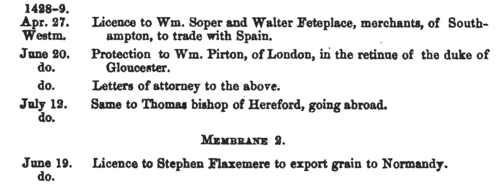
| Norfolk Charters
(1450-1459)
A large accumulation of documents preserved in the Bodleian Library, Oxford, formerly constituted the antiquarian collections of Anthony a Wood, Roger Dodsworth, Ralph Thoresby, Thomas Martin of Palgrave, Thomas Tanner bishop of St Asaph, Dr Richard Rawlinson, Richard Furney archdeacon of Surrey, and Richard Gough. A calendar of these was prepared by William H. Turner and published in 1878 under the title 'Calendar of Charters and Rolls preserved in the Bodleian Library'. The word 'charters' is here used in a rather loose sense, including virtually any manuscript or copy of a manuscript, but the bulk of the contents consists of mediaeval deeds of conveyance. Turner's calendar deals with each briefly, naming the principal parties and the nature of the deed, but hardly ever lists the witnesses. Many of these charters were undated (dating of deeds did not become general until around 1350) or so damaged or defective ('mutilated' is Turner's usual description) as no longer to display a legible date. However, he contrived, from the style of the script and/or the nature of the contents, to estimate dates in such cases. The sample scan is from the start of the Bedfordshire list. GRIGGES. Cost: £4.00.  | Sample scan, click to enlarge
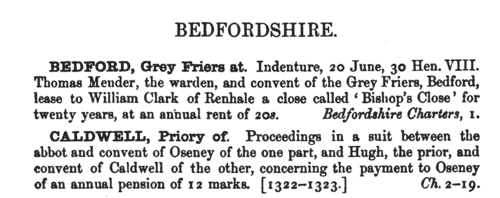
| Norfolk Feet of Fines
(1307-1485)
Pedes Finium - law suits, or pretended suits, putting on record the ownership of land in Norfolk. These abstracts were prepared by Walter Rye.GRIGGES. Cost: £4.00.  | Sample scan, click to enlarge

| Tenants, founders and incumbents of Yorkshire chantries
(1546-1548)
Chantries were established to perform services for the souls of their founders and other faithful dead, including annual obits and anniversaries at which alms were usually distributed. The chantries could be at an existing altar in a parish church, a new altar in a side chapel of an existing church, in a new chapel in the churchyard or some miles from an existing church: few were founded before 1300, and most date from 1450 to 1500. Hospitals were places provided by similar foundations to receive the poor and weak; there were also religious guilds, brotherhoods and fraternities, and colleges (like large chantries at which three or more secular priests lived in common). An Act of Parliament of 1545 gave king Henry VIII the power to dissolve such chantries, chapels, &c., the proceeds to be devoted to the expenses of the wars in France and Scotland. Commissioners were appointed 14 February 1546 to survey the chantries and seize their property, and from 1546 to 1548 the commissioners produced these certificates giving brief details of the establishment and nature of each foundation, with an inventory of valuables and rental of lands. The individuals named in the certificates are thus the founder, the present incumbent, and the tenants whose rents provided the chantry's income. All the surviving certificates were edited by William Page for the Surtees Society, and published from 1892.GRIGGES. Cost: £6.00.  | Sample scan, click to enlarge

| Inhabitants of Suffolk
(1568)
By Act of Parliament of December 1566 a subsidy of 8d in the £ on moveable goods and 4s in the £ on the annual value of land was raised from the lay (as opposed to clergy) population. These are the returns for Suffolk, printed in 1909 in the Suffolk Green Book series.GRIGGES. Cost: £4.00.  | Sample scan, click to enlarge

| Lawyers and officers of Lincoln's Inn
(1422-1586)
Lincoln's Inn is one of the ancient inns of court in London exclusively invested with the right to call lawyers to the English bar. The Black Books of Lincoln's Inn are the main administrative records of the society, containing the names of those filling the different offices year by year; the annual accounts of the Pensioner and the Treasurer; regulations; punishments and fines for misdemeanours. This edition, printed for the Inn in 1897, covers the first five surviving volumes.GRIGGES. Cost: £6.00.  | Sample scan, click to enlarge
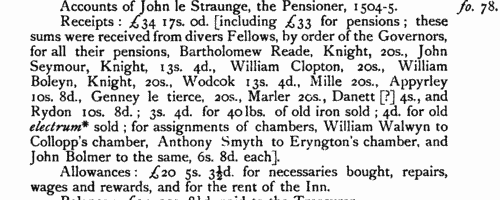
| Lord Willoughby in the Netherlands
(1580-1601)
Mrs S. C. Lomas of the Historical Manuscripts Commission prepared this calendar of the manuscripts of the Earl of Ancaster preserved at Grimsthorpe, published in 1907. The records covered are from 1550 to 1737, but the bulk of this volume is given over to an edition of the correspondence of Peregrine lord Willoughby, who was appointed governor of Bergen-op-Zoom in 1586, and spent the next ten years commanding English and Dutch forces against those of Spain. There are also a few pages (449 to 452) dealing with a scattering of ancient deeds (from c.1160 to 1547); some items from inventories (452-459, c.1522 to after 1742) and household accounts (459-482, 1560-1661) which attracted Mrs Lomas's attention; and notes from a muster roll of Baberg hundred, Suffolk, of about 1522, from which some names are given in the text.GRIGGES. Cost: £4.00.  | Sample scan, click to enlarge
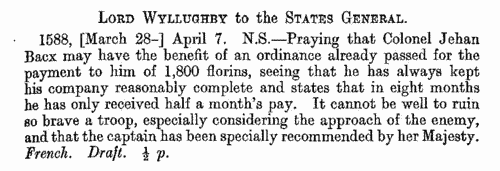
| Lawyers and officers of Lincoln's Inn
(1586-1660)
Lincoln's Inn is one of the ancient inns of court in London exclusively invested with the right to call lawyers to the English bar. The Black Books of Lincoln's Inn are the main administrative records of the society, containing the names of those filling the different offices year by year; the annual accounts of the Pensioner and the Treasurer; regulations; punishments and fines for misdemeanours. This edition, printed for the inn in 1898, covers the volumes from the 20th year of the reign of queen Elizabeth to the end of the Protectorate, supplemented by material entries from another series, called the Red Books, surviving from 1614, which deal with orders concerning and admittances to the chambers of the inn.GRIGGES. Cost: £4.00.  | Sample scan, click to enlarge
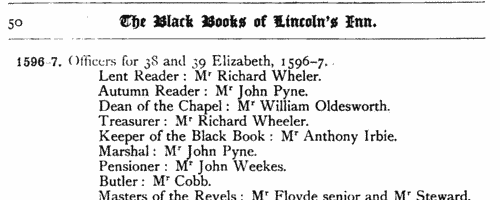
|
| 1 | 2 |  |
Research your ancestry, family history, genealogy and one-name study by direct access to original records and archives indexed by surname.
|












